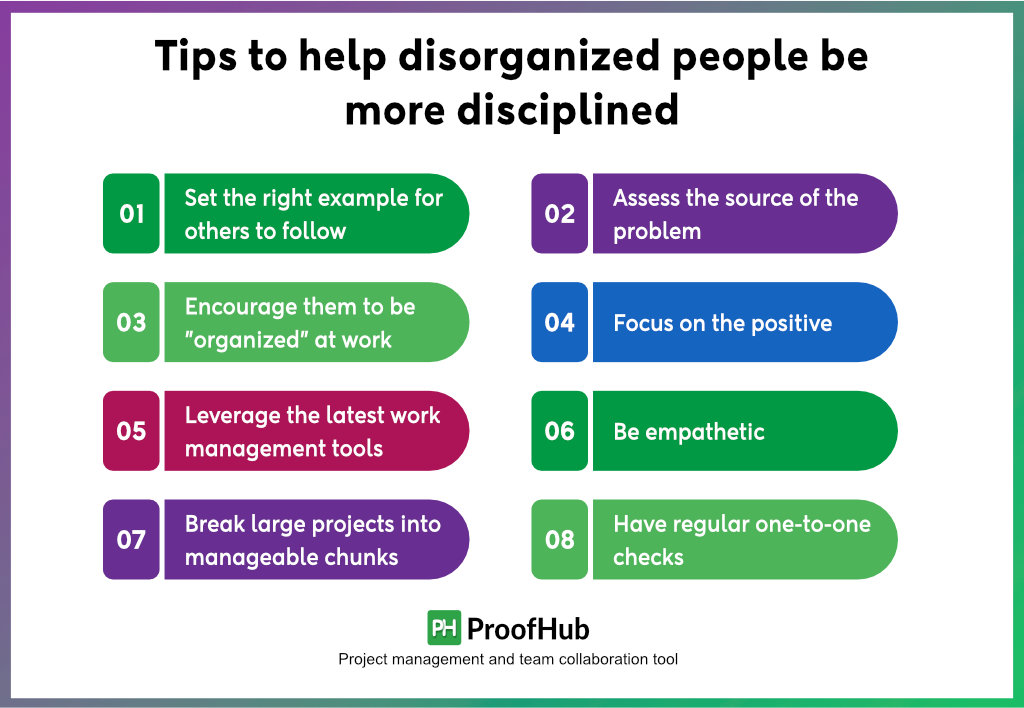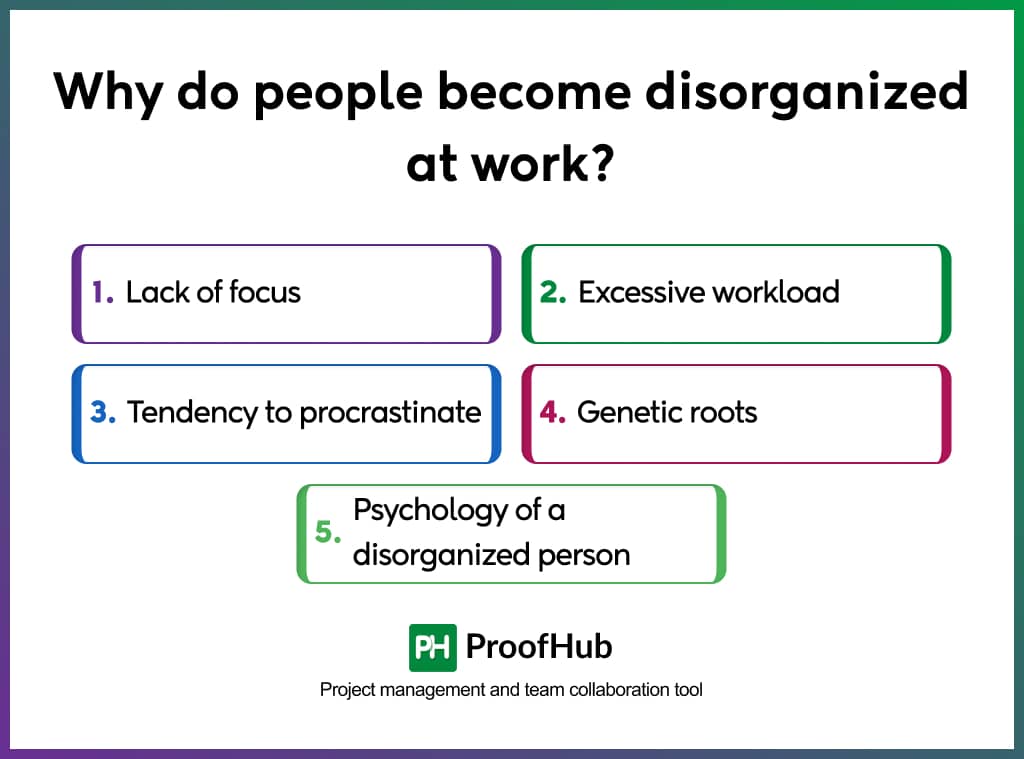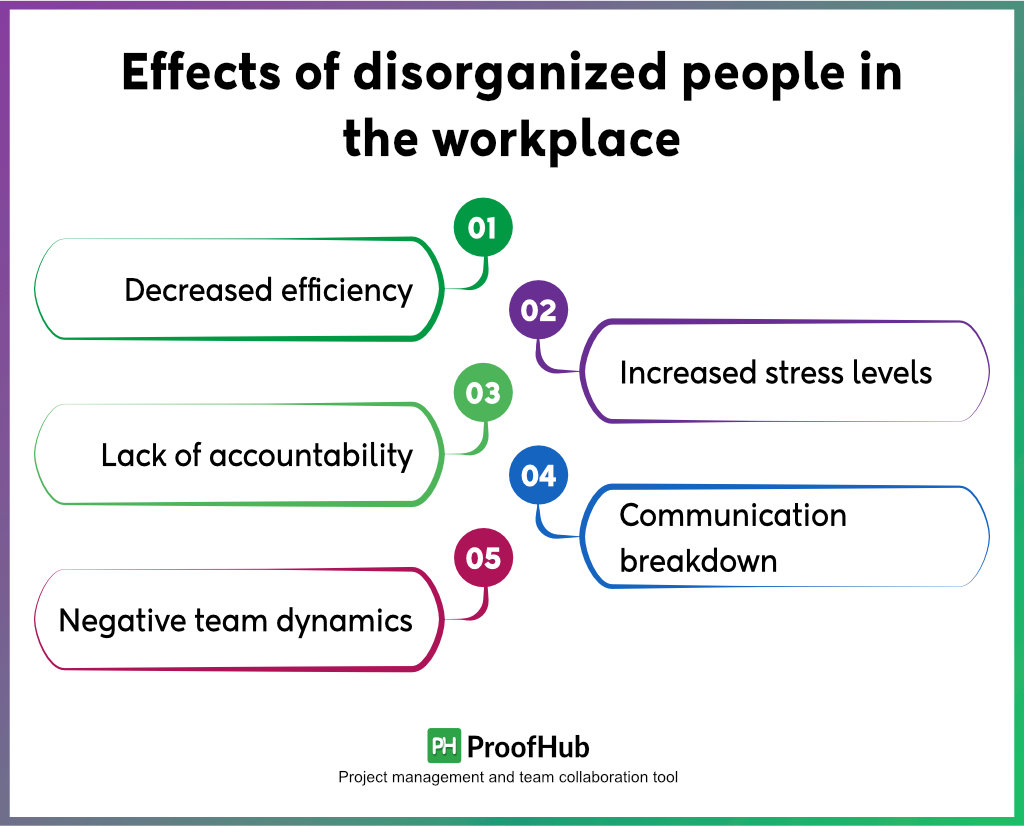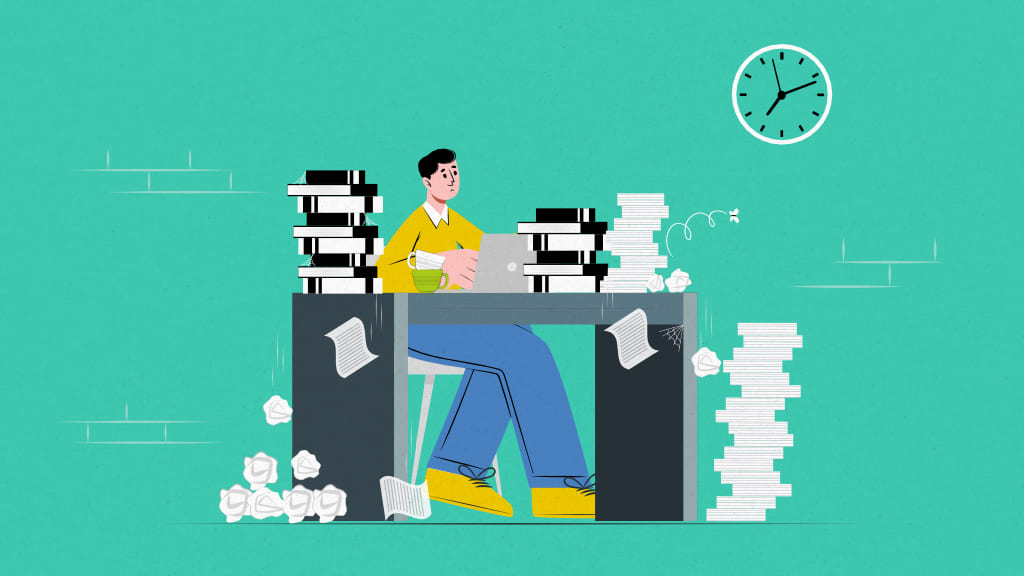Has this happened to you?
You reached your employee and asked for certain information, and they said, “Sorry, I have misplaced it” or “It was just here, and I don’t know where it has gone”!
Irritating, isn’t it?
Disorganized people at work cause trouble not only to them individually, but also to their associates, colleagues, and bosses.
According to Executive Support Magazine, 57% of managers report losing six hours of work a week due to disorganization. Moreover, if the person earns $50,000 annually, a business loses $11,000 due to disorganization, which is a huge drawback for a leader who wants their business to grow.
As a CEO, I completely understand your problem, as I have also faced such issues in my team. However, you don’t need to be demotivated because every problem has a solution. Allow me to share some proven tips and techniques that have been implemented in my company and can benefit your workflow as well.
So, bear with me in this post to make your employees organized and accountable and improve the overall efficiency of your business.
A Free guide to help you with proven ways to lead a project from start to finish, without confusion or jargon.

Let’s begin…
What is a disorganized employee?
A disorganized employee can be categorized as someone who struggles with maintaining order and structure in their work and environment. This often results in missed deadlines, incomplete tasks, and a cluttered workspace.
Disorganized employees may struggle to prioritize tasks, keep track of important documents, maintain productivity levels, and manage their time effectively. Their lack of organization can lead to decreased productivity, increased stress, and potential impacts on team performance and project output.
Signs of a disorganized person in the workplace
There are many ways to tell whether someone is unorganized at work, however, the following are some typical signs:
- Clutter around their work desk
- Missing deadlines regularly
- Lack of job accountability
- Confusion related to job responsibilities, assignments, and company protocols
- Absenteeism
- Poor quality of work, low productivity
- Not spending time on high-priority tasks
- Regularly misplacing important documents, files, or emails
- Inconsistency in communicating messages, failing to respond to emails, or giving timely feedback
- Forgetting meetings, appointments, or important events
Tips to help disorganized people be more disciplined
Disorganized management is difficult, but it’s possible to achieve this with the right strategies. Below are the practical tips that will help enhance organization and discipline in your company:

1. Set the right example for others to follow
Have you ever considered which factor separates an organized team from a disorganized one?
Undoubtedly, their leader!
Such leaders show employees the correct path, from well-organized work to balanced work-life harmony. They know how to lead by example.
Your employees replicate your actions and follow in your footsteps.
Have you ever thought of it this way?
So what gestures or things can you do to set the right examples that others follow and be able to better organize their work?
- Be punctual
Punctuality not only means to reach your office, but it is also how better you meet deadlines, and arrange your work schedule and meetings. From coming to the office on time, pre-plan the daily work, and keep these things on track so that your employees follow the same from the first day they join the office.
- Actively listen to your employees
Welcome your team with a smile, and a warm “hello” when you enter the office or when an employee approaches you with a question, politely respond, listen to their concerns, and work with them to find a solution.
- Stand up after failure
When employees look at their leader as disheartened, they won’t feel enthusiastic about doing work. No matter how badly you fail at one project, it’s a new day. Learn where you missed it, work on that part, and guide your employees on how to learn better from that incident.
- Acknowledge diversity
To create an environment where everyone respects each other and works together in synergy, acknowledging diversity in the workplace is important. For this, create particular policies, be open-minded, hire people from different cultures & celebrate their events.
- Work-life balance
Work-life balance is a big deal. Working until 9 pm every night as a leader affects more than just you. No matter what you tell your employees if their boss works that many hours, their employees will lose all sense of work-life balance. By stepping back and prioritizing what’s important, the boss will be more efficient while empowering their team to have a better work-life balance.
Read more: The secret to work-life balance
2. Assess the source of the problem
What do you do when you have workplace trouble?
Do you treat the symptoms right away, or do you pause to consider deeper analysis?
If you only address the symptoms – what you see on the surface – the problem will almost certainly reoccur. Therefore, perform a Root Cause Analysis. Determine what happened, why it happened, and what you can do to make it less likely to happen again.
3. Make them understand the importance of being “organized” at work
Ensuring team members understand the significance of being organized, you pave the way for smoother operations and enhanced productivity.
As Benjamin Franklin once wisely said, ‘For every minute spent in organizing, an hour is earned.’
Here are some quick ways you can use to make your team members understand the importance of being organized.
- Share examples to motivate: Share some practical examples of how organized team members have achieved significant career success.
- Arrange friendly meetings: You can also conduct friendly meetings to make employees understand the importance of the organization for them and the company.
- Training and resources: You could also offer workshops or online resources to help your employees learn organizational skills.
- Encourage feedback: Ask your team members how they’re doing with their organizational abilities and provide feedback where needed.
- Celebrate successes: Recognize and appreciate workers’ progress in their organizational skills to keep them inspired.
4. Focus on the positive
“It’s only after you’ve stepped outside your comfort zone that you begin to change, grow, and transform.” ― Roy T. Bennett
The key to a well-organized and happy team relies on the power of positivity. When employees have a positive way of thinking, they achieve even more and feel delighted. As a leader, you can cultivate positivity within your group. Commemorate achievements and inspire trust in your employees. Even in challenging times, concentrate on maintaining a positive outlook. Support your group by offering assistance and motivation whenever they require it. In addition, create a workplace that radiates positivity, where everyone feels valued and respected.
By welcoming positivity, you’ll unlock your group’s full potential, causing enhanced performance and overall happiness.
Read more: How do you create a happy work culture?
5. Leverage the latest work management tools
An additional crucial aspect that will help you manage disorganized individuals at the office is presenting a work management tool similar to ProofHub. These tools are software applications or systems created to help individuals and groups organize, track, and collaborate on their job tasks and projects. By using these tools in the workplace, you can determine and deal with potential barriers that hinder business progress, encouraging workers to properly handle their workload, fulfill deadlines, and enhance performance.
Work management tools’ benefits include:
- Increased presence: You can monitor employees’ tasks and track deadline dates, enabling you to identify hindrances and guarantee positioning employees to the goals.
- Improved collaboration: These tools assist in smooth cooperation with file sharing, real-time communication, and also progress tracking, making certain that projects are completed timely.
- Reduced stress: Work management tools relieve team members’ stress and anxiety by supplying a single platform for task management, helping them remain arranged as well as stay clear of confusion.
You can consider using work management tools to assist employees in your organization. They offer numerous advantages, improving performance and lowering stress by offering features such as task management, time management, collaboration, communication, and more.
6. Be empathetic
One more important action is to observe your employee’s habits. Are they acting differently lately, or is this their all-natural means of doing work? It’s critical to be understanding, as they might be dealing with some problems.
In such situations, showing compassion can go a long way in solving the problem without passing judgment or condemning them. Bear in mind that not everybody is naturally organized. While it might come very easy to you, it can be hard for others. Stay humble and remember that no one is perfect.
You can additionally try these methods:
- Listen actively to your employees, showing genuine passion and understanding.
- Understand and empathize with different perspectives and experiences.
- Encourage open and safe communication within the team.
- Recognize and validate employees’ emotions.
- Be flexible and supportive, accommodating reasonable requests and providing resources.
- Show appreciation for their work and achievements.
- Empower employees through involvement and autonomy.
7. Break large projects into smaller, manageable tasks
One of the most common characteristics of disorganized employees is the inability to properly allocate their time to high-priority tasks. “They can’t prioritize because they don’t even know where to start.” If this is the case with your employee, then you can arrange a meeting with their members, and using a project management tool like ProofHub you can create milestones, goals, and deliverables.
Read more: Tips to improve task allocation
8. Have regular one-to-one checks
Regular one-to-one checks are a must for effective team management. These meetings cover various work aspects, identify challenges, and ensure everyone is on the same page regarding goals. They’re super helpful for employees to overcome hurdles and boost productivity. During these check-ins, you can discuss development, resolve challenges, and motivate them to share their ideas and concepts. It produces a sense of responsibility and accountability within the group.
Furthermore, in these meetings, as opposed to focusing totally on task management, you can likewise examine their professional and personal development, understand their desires, and offer assistance. By doing this, you’re establishing strong communication, faith, and understanding. It’s a win-win situation where you resolve organizational concerns, establish clear goals, as well as support their development.
Why do people become disorganized at work?
There are many reasons why people become disorganized at work. Some common reasons are:

1. Lack of focus
Disorganized employees are not able to focus on their assignments, and their minds are constantly switching between various tasks. Poor concentration levels adversely impact their work performance, which eventually leads to below-par efficiency.
This is one of the main reasons why you will see a number of unfinished tasks with such employees.
Read more: Proven ways to stay focused at work
2. Excessive workload
Excessive workload makes your team members messy. Under relentless pressure to deliver work and meet deadlines, your employees can easily feel overwhelmed. Overwork and the resulting stress can also lead to a myriad of illnesses, which impact their mental and physical wellness.
You can not expect an over-stressed employee to pay attention to small things when they are much more worried about finishing the assigned task. So, in such cases, organizing things remains at the lower end of employees’ priorities.
3. Tendency to procrastinate
“In a 2020 survey, 12.4% of workers reported struggling with procrastination since the COVID-19 pandemic.”
The tendency to procrastinate on certain tasks stems from various reasons such as:
- Expecting you’re not going to achieve the value you’re trying to get
- The job role doesn’t seem worth it based on your ideals or situation
- Naturally acting on whims more often than not, which makes people pursue things that are immediately interesting as jobs fall by the wayside
- A subconscious fear of failure can put people under stress, and they may delay continuing the task
4. Genetic roots
Genetics can play an important role in the disorganization of an individual. Our genetics is like an owner’s manual for our body, determining how we do things. Sometimes certain gene mutations can hamper the way our brain processes information and organizes thoughts.
For instance, conditions like Attention Deficit Hyperactivity Disorder (ADHD) and certain types of autism disorders have specific genetic components. In these cases, the genetic component can influence the brain’s ability to follow the routine, stay focused, and organize the task.
5. Psychology of a disorganized person
The psychology of a disorganized individual can vary from person to person, yet some patterns and qualities define their mental phase. Disorganized individuals typically have a hard time maintaining order, structure, and organization. Their cluttered physical environment can show this, missed deadlines, lapse of memory, and problems taking care of tasks.
At the core of these habits exists a mix of factors. It may arise from terrible time-monitoring capabilities, problem-prioritizing jobs, or a tendency to become confused easily. Disorganized people could likewise show characteristics such as laziness, absence of focus, and challenges in decision-making.
Psychologically, disorganized people may experience disappointment, tension, stress, and anxiety, as well as instability, because they stop working to stay organized.
Compassion and support are essential to help them enhance their organizational abilities. You can even think of creating routines for them and discover techniques that work well for them.
Effects of disorganized people in the workplace
Having disorganized people in your work environment can have a big unfavorable impact on your organization’s efficiency, team effort, and also overall spirit.
Just a quick fact: 85% of workers worldwide are disengaged at the office, resulting in a shocking $7 trillion shed in efficiency, based on the latest report.
So, it’s necessary to understand these effects before discussing strategies to support and improve their organizational skills.👇

- Decreased efficiency: Disorganized people often need help with time management and prioritization. Their inability to stay organized brings about missed out on target dates, delayed projects, and a lack of performance. This affects their own productivity and ripples throughout the entire group’s performance.
- Increased stress levels: When team members are disorganized, it produces a tough work environment. Employees must pick up the slack, handle last-minute requests, and adjust to the lack of preparation. This includes stress, minimizes work satisfaction, and increases exhaustion among employees.
- Lack of accountability: Disorganized individuals regularly neglect their responsibilities, producing a culture of unaccountability in the group. This causes frustration among other members and they are burdened with extra work.
- Communication breakdown: Efficient work environment interaction is important, yet unorganized individuals prevent the process. They misplace important records, hold up replies to emails or messages, and also battle to forward details accurately. This results in misunderstandings and errors and impacts project communication and success.
- Negative team dynamics: Disorganization disrupts group dynamics and collaboration. Associates regularly follow up, redo jobs, and deal with blunders triggered by disorganized individuals. This strained relationship reduces trust and interferes with collaboration, making team goals difficult to attain.
The final word
Managing disorganized people at work is difficult. Still, it is necessary to bear in mind that everyone has a one-of-a-kind and unique functioning style. Some individuals are naturally organized, while others are not, which is fine. The idea is to establish standards to aid disorganized personnel and everybody else.
So, by following the methods stated above, you may discover the underlying causes of disorganization, such as anxiety or stress. If you believe your employees are facing such troubles, provide them with help and resources. Bear in mind that handling disorganized people is a chance for growth and skill development.
FAQs
How do you help someone get organized at work?
To help a person to be organized at the workplace, you can guide them in creating to-do lists, educate them about effective calendar usage, and motivate them to declutter their workspace. Furthermore, carrying out practices that promote focused work with routine breaks can boost efficiency.
How do you handle disorganization in a company system?
Managing poor organization in a business system involves offering training and needed resources to team members. It’s crucial to cultivate healthy communication and encourage collaboration among team members to enhance processes and improve organization within the system.
How do you work with messy people?
When working with messy individuals, it’s important to develop clear expectations concerning company policies. Implementing organizational systems, such as marked storage rooms, and also promoting open communication can help keep a clean and organized workspace for everybody involved.
How do you deal with unproductive staff?
To deal with unproductive staff, firstly you need to provide positive feedback to recognize areas of improvement. Then you can offer some additional support in areas where they are lacking. Moreover, I also recommend that you must discover ways to encourage employees to get involved in their jobs.
Also read:

